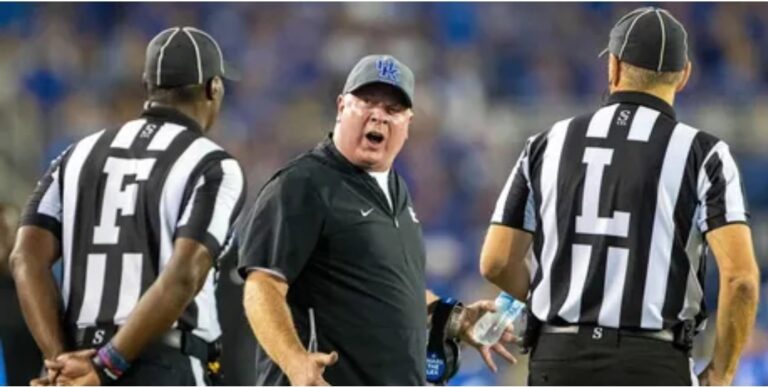Mark Stoops, head coach of the Kentucky Wildcats, found himself in the midst of controversy following a hard-fought loss to the Tennessee Volunteers in the 2024 season. Stoops, known for his usually measured approach, rightfully took aim at the officials after what he deemed a missed call involving a potentially dirty play against one of his players. His outcry highlights the ongoing frustrations coaches face in the high-stakes environment of college football, where crucial decisions, often involving player safety, can drastically influence the outcome of a game. The issue at hand? A play that many observers, including Stoops, believed should have drawn a penalty but did not, contributing to Kentucky’s 27-21 loss.
The play in question occurred in the second half, when Kentucky quarterback Devin Leary was on the receiving end of what Stoops and many others considered a questionable and possibly dangerous hit. Leary was sliding to the ground after a scramble, and as he did so, a Tennessee defender launched himself in what seemed to be a hit to the head or neck area. In the game’s aftermath, Stoops argued that the hit was not only late but potentially dirty—an uncalled penalty that, in his view, represented a significant lapse in officiating.
Stoops, whose reputation for being fiery and passionate about his team’s well-being is well-known, didn’t hold back. The veteran coach voiced his displeasure publicly, calling out the officials for failing to penalize Tennessee for what seemed like an avoidable, and dangerous, hit. Stoops was adamant that it was a missed opportunity to protect his player, stressing the importance of player safety and fair officiating in a game where emotions are often as intense as the competition itself.
In the days following the game, Stoops took his grievances to the Southeastern Conference (SEC), demanding accountability for the missed call. It was a move many expected, given his history of advocating for his players, but it was also a necessary one. The SEC, like many other major conferences, has long struggled with consistency in officiating. While referees cannot always catch every infraction, coaches and fans alike have become increasingly vocal when it comes to situations that may jeopardize the safety of players or change the course of a game. Stoops, in this case, made it clear that his concerns went beyond mere frustration with a single call—he saw it as a systemic issue that needed to be addressed at a higher level.
The SEC, for its part, has been under scrutiny in recent years for perceived inconsistencies in officiating. It’s a league where every game is a major event, and every play carries weight in terms of playoff implications and team rankings. Mark Stoops’ decision to address the SEC directly was a bold move, but it underscored a larger point: that in the SEC, the stakes are too high to let questionable officiating slide, especially when it could impact a team’s season.
In the end, while Kentucky’s loss to Tennessee was heartbreaking, Stoops’ decision to go to the SEC over the missed dirty play was a clear demonstration of his commitment to his players and the integrity of the game. Whether or not the SEC takes action, his bold stance serves as a reminder that college football is not just about winning and losing; it’s also about ensuring that the game is played with fairness, safety, and respect.


